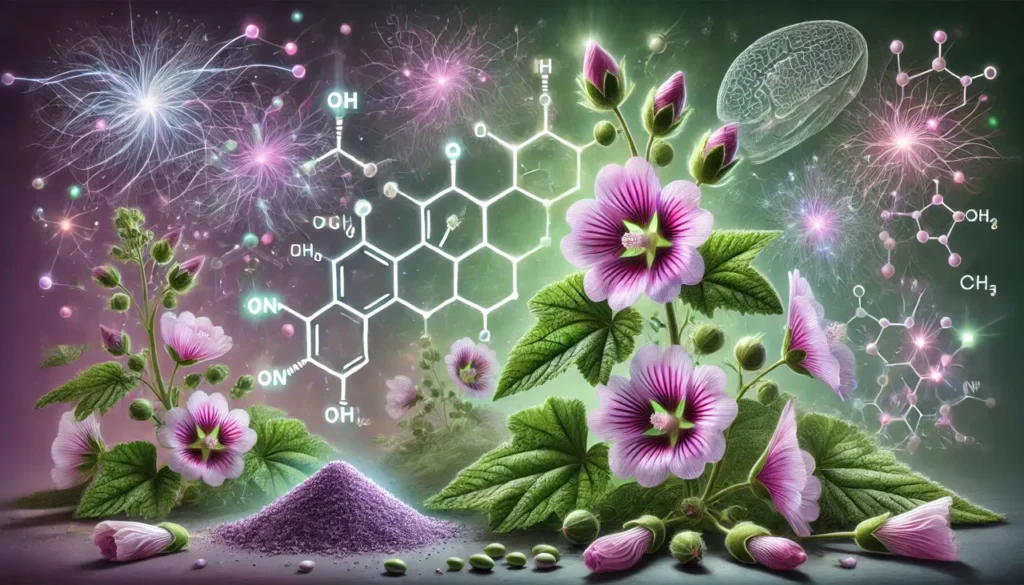Mallow (Malva sylvestris), commonly known as common mallow or high mallow, is a flowering plant traditionally used in herbal medicine for its anti-inflammatory and soothing properties. As interest in herbal supplements for cognitive and neurological health grows, mallow has drawn attention for its potential benefits as a nootropic—a supplement that may support brain function, enhance memory, and protect neurological health. This article provides an in-depth examination of mallow, exploring its chemical composition, physiological mechanisms, nootropic benefits, dosing guidelines, side effects, interactions, and considerations for safe supplementation.
You May Also Like:
Sources of Mallow
Mallow can be found in various natural environments, including meadows, fields, and open woodlands across Europe, Asia, and North America. As an edible and medicinal plant, its leaves, flowers, and roots have long been utilized in traditional medicine practices. Key sources of mallow include:
- Wild-harvested mallow: Mallow grows abundantly in the wild and is commonly harvested for its medicinal properties.
- Commercial supplements: Mallow is available in the form of dried leaves, powders, teas, and capsules designed for easy supplementation.
- Culinary uses: Mallow leaves are often incorporated into salads, soups, and teas, providing additional dietary sources of its bioactive compounds.
Soothe Digestive Discomfort and Support Cognitive Clarity with Marshmallow Root—Order Now on Amazon!

Chemistry of Mallow
Mallow contains a variety of phytochemicals, including polysaccharides, flavonoids, anthocyanins, and mucilage, which collectively contribute to its biological activity. The most notable components include:
- Mucilage: Mallow is rich in mucilage, a type of complex carbohydrate that forms a gel-like substance in water. Mucilage is known for its soothing properties, particularly in the gastrointestinal tract, but it also offers neuroprotective benefits by reducing inflammation and oxidative stress in the nervous system.
- Flavonoids: Mallow contains flavonoids like quercetin and kaempferol, which exhibit antioxidant and anti-inflammatory properties essential for brain health and cognitive function.
- Anthocyanins: These compounds provide mallow flowers with their distinctive color and possess antioxidant activity, helping to combat oxidative stress and potentially protect neurons from damage.

Physiological Mechanisms of Mallow in the Body and Brain
Mallow’s primary physiological actions relate to its anti-inflammatory, antioxidant, and protective effects on cellular health. In the context of brain function, these mechanisms contribute to its potential as a nootropic:
- Anti-inflammatory effects: Chronic inflammation in the brain can impair cognitive function and is associated with neurodegenerative diseases. Mallow’s bioactive compounds, particularly flavonoids and mucilage, help reduce inflammatory markers, supporting healthy neuronal function and potentially preventing cognitive decline.
- Antioxidant action: Oxidative stress damages cells and contributes to aging and neurodegenerative diseases. Mallow’s antioxidants, including flavonoids and anthocyanins, neutralize free radicals and reduce oxidative damage in neurons, which may help preserve cognitive function.
- Neuroprotection: Animal studies suggest that mallow extracts may protect nerve cells by decreasing levels of neurotoxic substances and supporting overall cellular health. These properties are particularly relevant to nootropic use, as neuroprotection is crucial for maintaining cognitive performance and preventing age-related cognitive decline.
Promote Respiratory Wellness and Mental Clarity with Marshmallow Root Extract—Shop Now on Amazon!

Potential Nootropic Benefits of Mallow
Mallow’s rich composition of mucilage, flavonoids, and antioxidants suggests several potential cognitive and neurological benefits:
- Cognitive Clarity and Mental Focus: By reducing oxidative stress and inflammation, mallow supports brain health and may contribute to improved mental clarity and focus, especially during periods of cognitive stress or fatigue. Furthermore, its antioxidant properties help protect neurons from free radical damage, which can otherwise impair cognitive performance over time. Mallow may also support enhanced mental resilience, helping the brain stay sharp under challenging circumstances.
- Memory Support: The flavonoids in mallow, particularly quercetin, have been studied for their potential to enhance memory. Flavonoids support neural health by promoting neurogenesis and synaptic plasticity, essential for learning and memory. Additionally, mallow’s effects on circulation may improve blood flow to the brain, ensuring a steady supply of oxygen and nutrients that are vital for memory formation. Regular intake of mallow could therefore play a role in maintaining memory accuracy and recall efficiency.
- Stress Reduction and Mood Regulation: Preliminary studies suggest that mallow may have a calming effect due to its soothing properties, which may extend to the nervous system. Mallow’s anti-inflammatory action may help reduce mental stress and stabilize mood, contributing to overall emotional well-being. Its mucilage content may also support the adrenal system, potentially alleviating physical symptoms associated with chronic stress. This natural mood stabilization could promote a balanced, calm mental state, making it easier to cope with daily stresses.
- Neuroprotection Against Age-Related Decline: Due to its antioxidant and anti-inflammatory actions, mallow may help protect the brain against cognitive decline associated with aging. Its compounds may shield neurons from oxidative damage and inflammation—processes often implicated in neurodegenerative diseases. Research on mallow’s neuroprotective properties suggests it may slow age-related memory loss, supporting long-term cognitive resilience. Regular intake of antioxidant-rich foods like mallow could contribute to a protective effect on brain cells, preserving cognitive abilities with age.

Dosage and Supplementation Guidelines
While there is no standardized dosage for mallow, recommendations are typically based on traditional use and preliminary research. For cognitive support, suggested doses vary:
- General Supplementation Dosage: Mallow is often taken in dosages ranging from 500 mg to 2,000 mg of dried herb per day, commonly consumed as tea or in capsule form.
- Therapeutic Nootropic Dosage: For individuals aiming to use mallow as a nootropic, doses closer to the upper range (1,000–2,000 mg per day) may provide enhanced benefits. Mallow extract forms tend to be more concentrated and may be effective at lower doses, around 300–600 mg daily, depending on potency.
- Form and Preparation: Mallow is available in various forms, including dried leaves for tea, capsules, and extracts. When used as a tea, around 1–2 teaspoons of dried mallow leaves per cup of water is recommended, taken 2–3 times per day for best results.
Mallow is generally considered safe for most individuals, though it’s advisable to start with a lower dose and monitor for any adverse reactions. Its mucilage content can sometimes interfere with nutrient absorption, so spacing mallow supplementation apart from meals and other supplements may be beneficial.
Support Healthy Digestion and Mental Sharpness with Marshmallow Root—Order Now on Amazon!

Side Effects and Safety Considerations
Mallow is generally well-tolerated, with limited reports of adverse effects. However, some side effects may occur:
- Gastrointestinal Effects: Due to its mucilage content, mallow may cause mild digestive discomfort in some individuals, including bloating or gas. Mucilage may also reduce the absorption of nutrients, so prolonged use should be monitored.
- Allergic Reactions: Allergies to mallow are rare but possible, particularly in individuals sensitive to plants in the Malvaceae family. Symptoms may include itching, rash, or swelling.
- Potential Sedative Effect: Mallow has mild sedative properties that may contribute to relaxation; however, excessive consumption may lead to drowsiness, especially when combined with other calming supplements.
Interactions with Other Supplements and Medications
As with any supplement, it’s essential to understand potential interactions with medications and other supplements:
- Antidiabetic Medications: Mallow may affect blood sugar levels, so caution is advised for individuals taking antidiabetic medications. Close monitoring of blood sugar levels is recommended, as mallow’s effects could potentiate hypoglycemia.
- Antihypertensive Medications: The mild sedative effects of mallow may influence blood pressure, so individuals on blood pressure-lowering medications should consult a healthcare provider to avoid hypotension.
- Anticoagulant and Antiplatelet Drugs: Mallow’s potential to influence blood viscosity has led some experts to recommend caution for individuals taking blood-thinning medications like warfarin or aspirin.
- Other Nootropics: When combined with other cognitive-enhancing supplements, such as Ginkgo biloba or Bacopa monnieri, mallow may enhance the effects of these nootropics, although more research is needed. Combining mallow with nootropics that have overlapping antioxidant effects may provide cumulative benefits for brain health.
Risks for Individuals with Certain Health Conditions
While mallow is safe for most people, certain health conditions require caution:
- Diabetes: Individuals with diabetes should monitor their blood sugar levels when using mallow, as its mucilage content may impact glucose metabolism.
- Kidney or Liver Conditions: Limited research exists on mallow’s effects in individuals with impaired kidney or liver function, so medical consultation is recommended in these cases.
- Pregnancy and Lactation: Insufficient evidence exists regarding the safety of mallow during pregnancy or breastfeeding. Consulting a healthcare professional is recommended before using mallow supplements.
Support Respiratory Health and Brain Function with Marshmallow Root—Order Now on Amazon!

Conclusion: Should You Consider Mallow as a Nootropic?
Mallow, with its blend of mucilage, flavonoids, and antioxidants, offers intriguing possibilities as a nootropic supplement. Its ability to support brain health by reducing oxidative stress and inflammation, along with its calming properties, suggests that mallow may enhance cognitive clarity and protect against age-related cognitive decline. While evidence is still emerging, mallow’s traditional use and biochemical composition make it a promising candidate for those seeking natural support for brain health.
As with any supplement, however, individuals considering mallow should consult a healthcare professional, especially if they are managing pre-existing health conditions or taking medications. By incorporating mallow responsibly into a balanced supplement regimen, individuals may experience enhanced cognitive support and overall wellness.

References:
- Leaves, flowers, immature fruits and leafy flowered stems of Malva sylvestris: a comparative study of the nutraceutical potential and composition . Retrieved from: https://pubmed.ncbi.nlm.nih.gov/20233600/
- A Review on Health Benefits of Malva sylvestris L. Nutritional Compounds for Metabolites, Antioxidants, and Anti-Inflammatory, Anticancer, and Antimicrobial Applications. Retrieved from: https://pmc.ncbi.nlm.nih.gov/articles/PMC8382527/
- The protective effect of Malva sylvestris on rat kidney damaged by vanadium . Retrieved from: https://pubmed.ncbi.nlm.nih.gov/21513564/
Important Note: The information contained in this article is for general informational purposes only, and should not be construed as health or medical advice, nor is it intended to diagnose, prevent, treat, or cure any disease or health condition. Before embarking on any diet, fitness regimen, or program of nutritional supplementation, it is advisable to consult your healthcare professional in order to determine its safety and probable efficacy in terms of your individual state of health.
Regarding Nutritional Supplements Or Other Non-Prescription Health Products: If any nutritional supplements or other non-prescription health products are mentioned in the foregoing article, any claims or statements made about them have not been evaluated by the U.S. Food and Drug Administration, and such nutritional supplements or other health products are not intended to diagnose, treat, cure, or prevent any disease.


